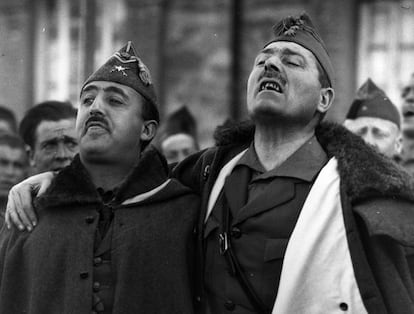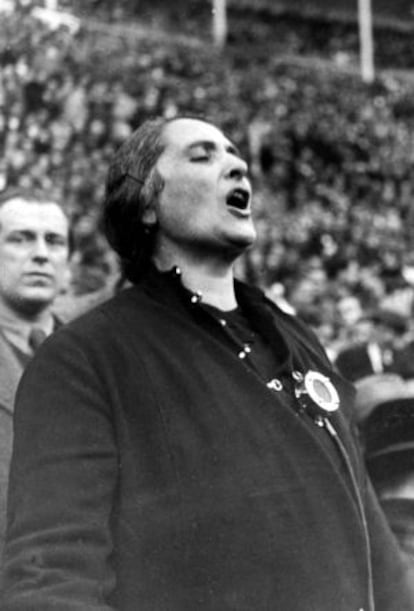An improved historical biography?
The Royal Academy of History's latest volumes dodge repeated controversy

The first 25 volumes of the Spanish Biographical Dictionarysparked outrage when they were first published by the Royal Academy of History, given that key 20th-century figures involved in dark episodes of Spain's past, in particular former dictator Francisco Franco, were portrayed in overly benevolent terms. Calls for the publicly funded work to be corrected have, however, died down ever since the conservative Popular Party came to power, in late 2011. In fact, the controversial dictionary was recently awarded a 100,000-euro grant.
Thirteen new volumes of the work have just been published, and seem to avoid falling into the same trap as the previous lot.
The biographical entries for figures such as Spanish Republican leader Dolores Ibárruri, known as "La Pasionaria," exiled Prime Minister of Republican Spain Juan Negrín and politician and trade unionist Largo Caballero have been written with taste.
For example, it falls to the conservative historian Stanley G. Payne to write about Ibárruri, and his colleague Gabriel Cardona pens the entry about Lieutenant General Jaime Miláns del Bosch, who was involved in the failed coup in Spain in 1981.
Some of the entries recognize historians that are not favorites of the house, as is the case with economist, historian and diplomat Ángel Viñas, cited as a prestigious source thanks to his biography of Negrín.
What does remain from the first set of volumes in the second set is an amiable tone toward the military leaders who led the uprising in 1936 that culminated in the Civil War. Their darker episodes are omitted while their achievements are given a new sheen in the set of reference books.

- Dolores Ibárruri - La Pasionaria. "She soon abandoned Catholicism, but she always maintained an attitude of deep religious faith - which was later consecrated - for socialism, and from 1920 onward, for communism. [...] The combination of eloquence and passion, her rich tone of voice, her tall stature, her image of a woman always dressed in black... All of that combined to create an image that was widely disseminated by the propaganda machine of the party as the best known Spanish communist from the Civil War and later the most famous Spanish woman of the 20th century."
- Emilio Mola Vida. Nationalist commander. "On the 21st, he spoke to Azaña, the war minister, who order him to be detained. He was locked up in the military prisons of San Francisco. [...] He took part in the Sanjurjo uprising on August 10, 1932, which saw him separated from the service and sent to the second reserve. At that moment, lacking resources, he made toys, and wrote children's stories and a treatise on chess, despite not being a player.
- Juan Negrín. Prime minister 1937-1939. "Sending the gold reserves to the Soviet Union was aimed at safeguarding the resources from the threat that they would fall into the hands of the Francoist army and also pay for the cost of the war. [...] Research by Ángel Viñas has shown that 27.4 percent of the treasury that was mobilized by the Bank of Spain was acquired by France, and the rest went to the USSR. In spite of such a controversial action - which has been systematically manipulated by the detractors of Negrín, and in particular by Francoist propaganda - the process had the support of the prime minister of the government, Francisco Largo Caballero, and the approval of the rest of the members of the government."
- José Millán Astray. Founder and first commander of the Spanish Foreign Legion. "The code for the new unit was the Legionnaire's Creed, which, according to its own creator in Bushido, was based on the moral code of the samurais. [...] The Flags of the Third, with their magnificent preparation, were the fundamental secret weapon of Berenguer, which avoided (1921) the fall of Melilla into the hands of [North African rebel] Abd el Krim. [...] There are a number of anecdotes that are told of Millán Astray, some of which are positive and some that are not. In the famous confrontation that he had with Unamuno at the University of Salamanca, the phrase 'Death to intelligence!' has been criticized by many historians, but clarified by others."
- Francisco Largo Caballero. Socialist and union leader and prime minister (1936-1937). "As well as their bad personal relationships, there was also a progressive divergence of their political projects, which, in the case of the Asturian [Indalecio Prieto], were directed to the salvation of Republican democracy, and in the case of Largo Caballero, were headed toward the dictatorship of the proletariat. [...] Ahead of the military uprising of July 18, he called for arms to be handed out among the working classes. During the following days, he visited the front in the Madrid Sierra dressed as a militiaman and armed with a rifle."
- Juan March. Financier and banker allied with Nationalists. "When the Civil War came, March was one of the principal material supporters of the Burgos government, way beyond the story of the purchase of the [plane] Dragón Rapide to transport Franco from the Canaries to Morocco. The man with the most knowledge of the subject, José Ángel Sánchez Asiaín, does not hesitate to label the financial assistance as one of the elements that made up the trio of economic factors upon with the victory of the Nationalist side rests. In spite of which, a relationship with the Galician dictator in the 1940s was not characterized by cordiality nor understanding."







































